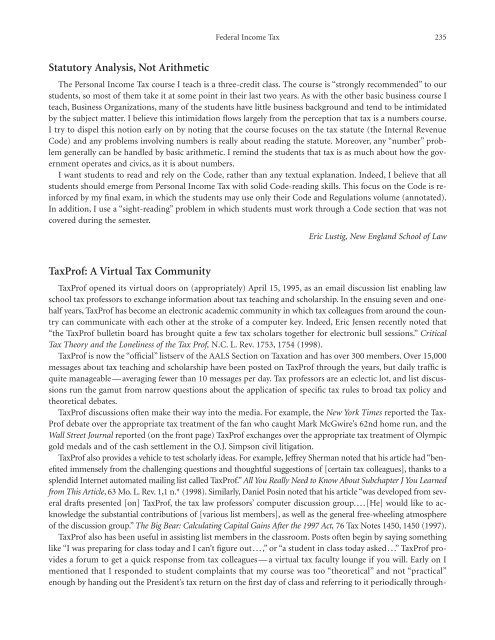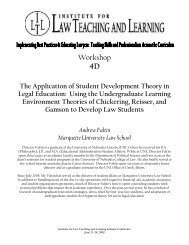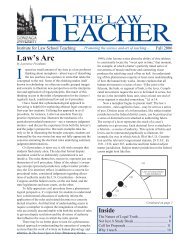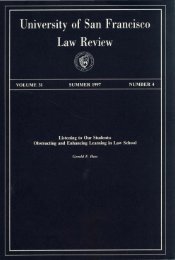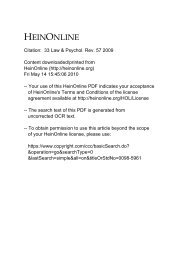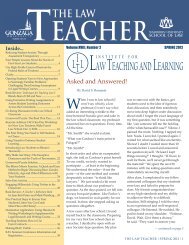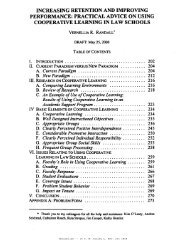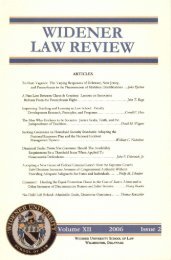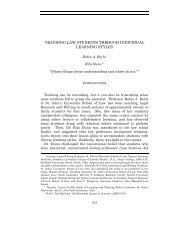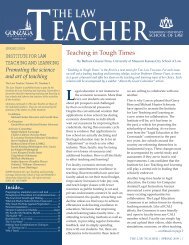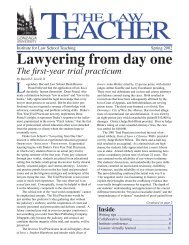Teaching the Law School Curriculum - Institute for Law Teaching ...
Teaching the Law School Curriculum - Institute for Law Teaching ...
Teaching the Law School Curriculum - Institute for Law Teaching ...
You also want an ePaper? Increase the reach of your titles
YUMPU automatically turns print PDFs into web optimized ePapers that Google loves.
Statutory Analysis, Not Arithmetic<br />
Federal Income Tax 235<br />
The Personal Income Tax course I teach is a three-credit class. The course is “strongly recommended” to our<br />
students, so most of <strong>the</strong>m take it at some point in <strong>the</strong>ir last two years. As with <strong>the</strong> o<strong>the</strong>r basic business course I<br />
teach, Business Organizations, many of <strong>the</strong> students have little business background and tend to be intimidated<br />
by <strong>the</strong> subject matter. I believe this intimidation flows largely from <strong>the</strong> perception that tax is a numbers course.<br />
I try to dispel this notion early on by noting that <strong>the</strong> course focuses on <strong>the</strong> tax statute (<strong>the</strong> Internal Revenue<br />
Code) and any problems involving numbers is really about reading <strong>the</strong> statute. Moreover, any “number” problem<br />
generally can be handled by basic arithmetic. I remind <strong>the</strong> students that tax is as much about how <strong>the</strong> government<br />
operates and civics, as it is about numbers.<br />
I want students to read and rely on <strong>the</strong> Code, ra<strong>the</strong>r than any textual explanation. Indeed, I believe that all<br />
students should emerge from Personal Income Tax with solid Code-reading skills. This focus on <strong>the</strong> Code is rein<strong>for</strong>ced<br />
by my final exam, in which <strong>the</strong> students may use only <strong>the</strong>ir Code and Regulations volume (annotated).<br />
In addition, I use a “sight-reading” problem in which students must work through a Code section that was not<br />
covered during <strong>the</strong> semester.<br />
TaxProf: A Virtual Tax Community<br />
Eric Lustig, New England <strong>School</strong> of <strong>Law</strong><br />
TaxProf opened its virtual doors on (appropriately) April 15, 1995, as an email discussion list enabling law<br />
school tax professors to exchange in<strong>for</strong>mation about tax teaching and scholarship. In <strong>the</strong> ensuing seven and onehalf<br />
years, TaxProf has become an electronic academic community in which tax colleagues from around <strong>the</strong> country<br />
can communicate with each o<strong>the</strong>r at <strong>the</strong> stroke of a computer key. Indeed, Eric Jensen recently noted that<br />
“<strong>the</strong> TaxProf bulletin board has brought quite a few tax scholars toge<strong>the</strong>r <strong>for</strong> electronic bull sessions.” Critical<br />
Tax Theory and <strong>the</strong> Loneliness of <strong>the</strong> Tax Prof, N.C. L. Rev. 1753, 1754 (1998).<br />
TaxProf is now <strong>the</strong> “official” listserv of <strong>the</strong> AALS Section on Taxation and has over 300 members. Over 15,000<br />
messages about tax teaching and scholarship have been posted on TaxProf through <strong>the</strong> years, but daily traffic is<br />
quite manageable — averaging fewer than 10 messages per day. Tax professors are an eclectic lot, and list discussions<br />
run <strong>the</strong> gamut from narrow questions about <strong>the</strong> application of specific tax rules to broad tax policy and<br />
<strong>the</strong>oretical debates.<br />
TaxProf discussions often make <strong>the</strong>ir way into <strong>the</strong> media. For example, <strong>the</strong> New York Times reported <strong>the</strong> Tax-<br />
Prof debate over <strong>the</strong> appropriate tax treatment of <strong>the</strong> fan who caught Mark McGwire’s 62nd home run, and <strong>the</strong><br />
Wall Street Journal reported (on <strong>the</strong> front page) TaxProf exchanges over <strong>the</strong> appropriate tax treatment of Olympic<br />
gold medals and of <strong>the</strong> cash settlement in <strong>the</strong> O.J. Simpson civil litigation.<br />
TaxProf also provides a vehicle to test scholarly ideas. For example, Jeffrey Sherman noted that his article had “benefited<br />
immensely from <strong>the</strong> challenging questions and thoughtful suggestions of [certain tax colleagues], thanks to a<br />
splendid Internet automated mailing list called TaxProf.” All You Really Need to Know About Subchapter J You Learned<br />
from This Article, 63 Mo. L. Rev. 1,1 n.* (1998). Similarly, Daniel Posin noted that his article “was developed from several<br />
drafts presented [on] TaxProf, <strong>the</strong> tax law professors’ computer discussion group.... [He] would like to acknowledge<br />
<strong>the</strong> substantial contributions of [various list members], as well as <strong>the</strong> general free-wheeling atmosphere<br />
of <strong>the</strong> discussion group.” The Big Bear: Calculating Capital Gains After <strong>the</strong> 1997 Act, 76 Tax Notes 1450, 1450 (1997).<br />
TaxProf also has been useful in assisting list members in <strong>the</strong> classroom. Posts often begin by saying something<br />
like “I was preparing <strong>for</strong> class today and I can’t figure out ... ,” or “a student in class today asked ...” TaxProf provides<br />
a <strong>for</strong>um to get a quick response from tax colleagues — a virtual tax faculty lounge if you will. Early on I<br />
mentioned that I responded to student complaints that my course was too “<strong>the</strong>oretical” and not “practical”<br />
enough by handing out <strong>the</strong> President’s tax return on <strong>the</strong> first day of class and referring to it periodically through-


